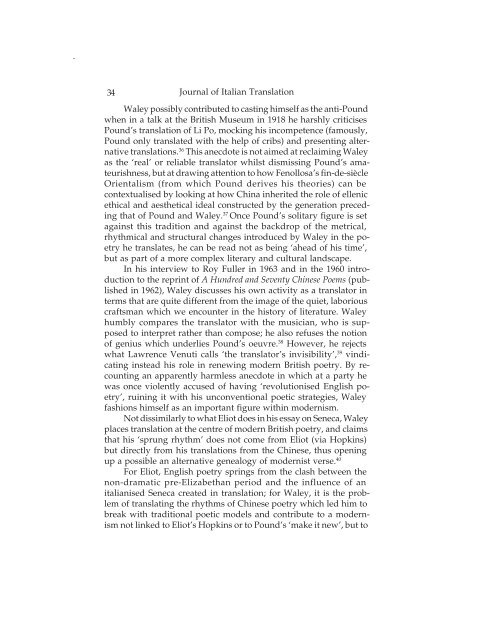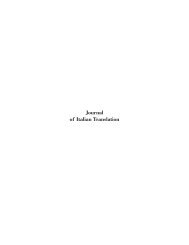Journal of Italian Translation
Journal of Italian Translation
Journal of Italian Translation
Create successful ePaper yourself
Turn your PDF publications into a flip-book with our unique Google optimized e-Paper software.
34 <strong>Journal</strong> <strong>of</strong> <strong>Italian</strong> <strong>Translation</strong><br />
Waley possibly contributed to casting himself as the anti-Pound<br />
when in a talk at the British Museum in 1918 he harshly criticises<br />
Pound’s translation <strong>of</strong> Li Po, mocking his incompetence (famously,<br />
Pound only translated with the help <strong>of</strong> cribs) and presenting alternative<br />
translations. 36 This anecdote is not aimed at reclaiming Waley<br />
as the ‘real’ or reliable translator whilst dismissing Pound’s amateurishness,<br />
but at drawing attention to how Fenollosa’s fin-de-siècle<br />
Orientalism (from which Pound derives his theories) can be<br />
contextualised by looking at how China inherited the role <strong>of</strong> ellenic<br />
ethical and aesthetical ideal constructed by the generation preceding<br />
that <strong>of</strong> Pound and Waley. 37 Once Pound’s solitary figure is set<br />
against this tradition and against the backdrop <strong>of</strong> the metrical,<br />
rhythmical and structural changes introduced by Waley in the poetry<br />
he translates, he can be read not as being ‘ahead <strong>of</strong> his time’,<br />
but as part <strong>of</strong> a more complex literary and cultural landscape.<br />
In his interview to Roy Fuller in 1963 and in the 1960 introduction<br />
to the reprint <strong>of</strong> A Hundred and Seventy Chinese Poems (published<br />
in 1962), Waley discusses his own activity as a translator in<br />
terms that are quite different from the image <strong>of</strong> the quiet, laborious<br />
craftsman which we encounter in the history <strong>of</strong> literature. Waley<br />
humbly compares the translator with the musician, who is supposed<br />
to interpret rather than compose; he also refuses the notion<br />
<strong>of</strong> genius which underlies Pound’s oeuvre. 38 However, he rejects<br />
what Lawrence Venuti calls ‘the translator’s invisibility’, 39 vindicating<br />
instead his role in renewing modern British poetry. By recounting<br />
an apparently harmless anecdote in which at a party he<br />
was once violently accused <strong>of</strong> having ‘revolutionised English poetry’,<br />
ruining it with his unconventional poetic strategies, Waley<br />
fashions himself as an important figure within modernism.<br />
Not dissimilarly to what Eliot does in his essay on Seneca, Waley<br />
places translation at the centre <strong>of</strong> modern British poetry, and claims<br />
that his ‘sprung rhythm’ does not come from Eliot (via Hopkins)<br />
but directly from his translations from the Chinese, thus opening<br />
up a possible an alternative genealogy <strong>of</strong> modernist verse. 40<br />
For Eliot, English poetry springs from the clash between the<br />
non-dramatic pre-Elizabethan period and the influence <strong>of</strong> an<br />
italianised Seneca created in translation; for Waley, it is the problem<br />
<strong>of</strong> translating the rhythms <strong>of</strong> Chinese poetry which led him to<br />
break with traditional poetic models and contribute to a modernism<br />
not linked to Eliot’s Hopkins or to Pound’s ‘make it new’, but to

















